
The nation's cheerer-upper: In celebration of Eric Sykes
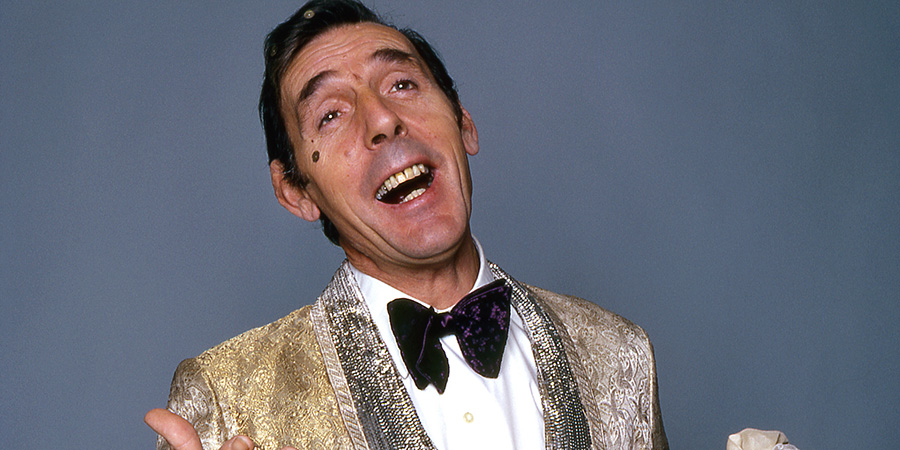
The 4th of May 2023 marks the centenary of the birth of Eric Sykes. As anniversaries in British comedy history go, this date is one especially well worth celebrating, because few figures contributed so much, so well, and with such an inspirationally benign spirit, as Eric Sykes did to the task of making millions of people laugh.
In his later years there was something extraordinary about Eric simply as a human being. Commonly described as being 'almost deaf' (due at least in part to multiple complications from an infected mastoid back in the Fifties) and 'partially blind' (due to a degenerative condition known as dry macular disciform) one feared, upon first meeting him, that communication could be quite a problem, but it soon became disarmingly apparent that he could converse with you without the slightest sign of a struggle.
The reason why he could hear you was that he wore special lens-free bone conduction spectacles. Ingeniously designed with a pair of tiny hidden pads that vibrated just behind his ears, they transmitted sounds down into his cochlea so effectively that one soon forgot, when talking to him, that there was any aural issue at all.
Seeing people must have been even more of a problem, beyond glimpsing a blurry presence, but he never, ever, let on. The only evidence of his condition was on his desk, in the form of an Aladdin machine.
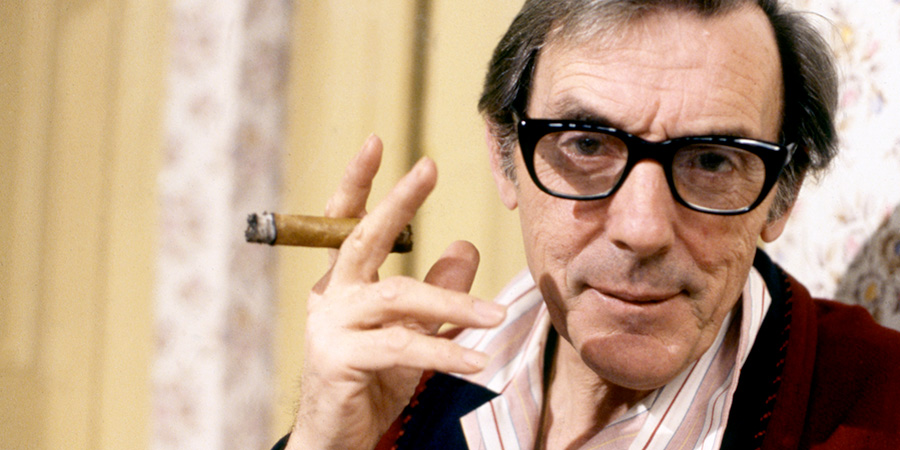
The Aladdin (which resembled a cross between an old school-style overhead projector and a primitive desktop monitor) is a closed-circuit unit that enables the reader to place a book, magazine, or sheet of paper on an adjustable tray, and then a camera projects the printed material on to a TV-style screen. The reader can adjust the size and clarity of the words displayed, as well as - depending on what suits the individual's peculiar vision - reversing the contrast from black letters on a white background to white letters on a black background (or else some other combination of colours - Eric, if my memory is correct, sometimes preferred to use bright blues and yellows).
His devoted manager and agent, Norma Farnes, was on hand to read to him any correspondence, contracts or script synopses that required a prompt response, and there would sometimes be audio recordings relating to longer projects that were pending, but otherwise he could usually be seen at his desk working his way slowly but doggedly through each projected passage. Always determined to find a positive in a negative, he insisted that the slowness of the process simply made him more attentive to the polishing of each detail.
Writing, as time went on, was even more of a cause of frustration, as Eric still relied stubbornly on his pen and paper - a process which once famously saw him run out of ink without noticing and thus hand his typist several blank pages of lost comic craft - but, once again, he found ways to make it work. Re-arming himself with special 'low-vision' pens and brightly-coloured paper, he was soon back doing what he loved doing, shaping lines to summon up laughs.
Eric was actually so good at coping with his struggles with sights and sounds that when Spike Milligan - one of his oldest friends, who had shared the same set of offices with him for (by that time, in the mid-1990s) more than forty years - went to see him on stage in a play at the Theatre Royal in Bath, he told their mutual manager, Norma Farnes, as they were leaving: 'You know,' he exclaimed, shaking his head incredulously, 'I'm convinced that old bugger has been lying to us all this time - he MUST be able to see and hear, it's just not possible to do what he does with those problems, it's just not, it's bloody unbelievable!'
His professional achievements were, of course, similarly astonishing. Over the course of a career that stretched all the way from the Forties through to the Noughties, Eric Sykes helped cultivate the character, and conscience, of British comedy.
As a writer, he came up with some of the most imaginative and influential stand-up comedy that the country has ever seen, inspiring countless others, right through to today, to attempt to emulate his rare invention. He also excelled at sitcoms, silent comedy and sketches, and even slipped out some engaging little stories as novels (his 1995 UFOs Are Coming Wednesday, for example, still has the potential to make a fine British film).
As a performer, his skills - though under-appreciated by some - were also considerable. Whether it was the Stan Laurel-slyness of his performance alongside Terry-Thomas in Those Magnificent Men In Their Flying Machines (1965), or the Keaton-like restraint of his contribution to The Others (2001), he was able, with subtle precision, to bring a naturalness to his acting that could put to shame some of those who specialised in it as a full-time job.
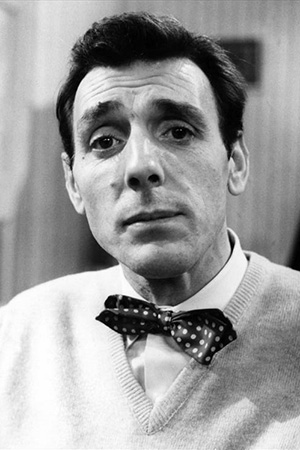
Combining cleverness with kindness, there was always something uplifting in the things that he did. Humour, for him, was a humanising force, and the most helpful way to share one's hard-won wisdom.
'If you understand comedy, you understand life,' he once said. 'Drama, tragedy - everybody has these. But with humour you've got all these and the antidote. You have found the answer.'
He spoke with authority about such things, because of the life that he had been given, and what he had gone on to make of it. Drama came to him, but he searched for comedy.
He was born in the heart of the North of England - 'where all good comedians come from' - at 238 Henshaw Street in Oldham, Lancashire, on 4th May 1923, the second son of Vernon Sykes, a cotton mill spinner, and Harriet (née Stacey), a homemaker. Tragedy struck before consciousness could properly come, because Eric's mother - aged just twenty-two - died shortly after giving him birth (it would only be very late in his own life when, thanks to the research of Norma Farnes, he would learn of how much longer she had lingered - which caused him to say, with a tear in his eye: 'So she did hold me...').
He was separated from his surviving family for the first two years of his childhood because, while his father was afforded time alone in which to grieve, his maternal grandmother could only find room for his older brother, Vernon Jnr, and so Eric was placed in the care of a nearby female friend. Upon being returned to his father's custody at the end of 1925, he discovered that he not only now had a step-mother, called Florrie, but also a new baby step-brother, named John.
Considered too old to be cradled maternally, but still young enough to miss it, Eric received no parental help in overcoming his 'desperate yearning to belong, to be acknowledged,' although 'even a smile would have sufficed,' and was left to feel 'like a lodger in my own house'. His pragmatic response to this lack of familial warmth and intimacy would be to retreat inside 'the fantasy world in my head, which transcended the hopelessness of the surrounding poverty and deprivation'.
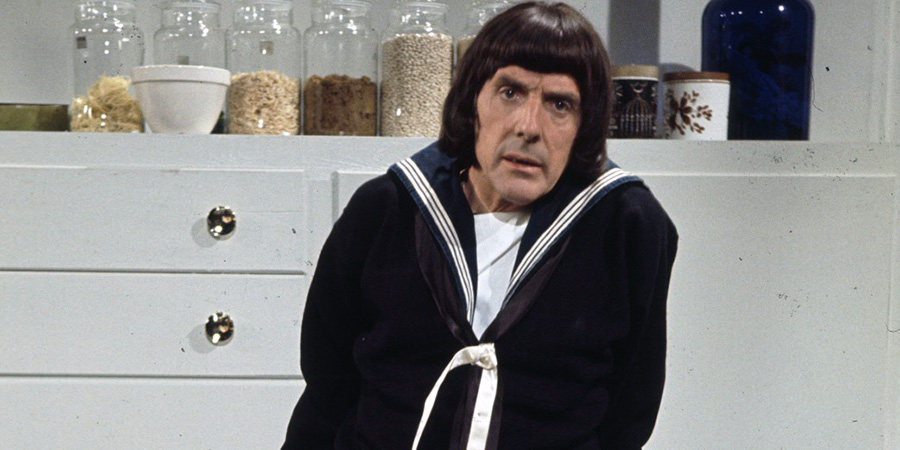
Academically, Sykes would later claim to have been an under-achiever in every subject except art. Always quite a sickly child (soon after he was born, the family doctor took one look at him, shook his head and said, 'You'll never rear him'), he coped with the no-nonsense hustle and bustle of an over-crowded working-class school as well as he possibly could, taking care not to disturb the teachers so that they would not care to disturb him, and he left at the age of fourteen with a basic ability to 'read, write, add-up, subtract and divide' (thus feeling, as he later put it, 'well equipped to take my place as a member of the working-class').
There followed spells spent labouring as a woodworker, painter and greengrocer's assistant before bowing to his supposed destiny and joining his father inside the clattering cotton mill. When war intervened, Sykes initially served in the RAF as a wireless operator, but was seconded to the Army (serving in Normandy, Brussels and, for the longest period, Schleswig-Holstein), earned a Sergeant's stripes, and began performing (initially under the pseudonym of 'Rick Allen') in a forces touring revue.
Thanks to a bureaucratic bungle which resulted in his registration being misplaced, he was passed like an unaddressed parcel from one local RAF camp to another until, out of a mixture of pity, embarrassment and exasperation, he was sent back home to Britain on compassionate leave. It was there, after much scratching of heads within Whitehall, that Geoffrey de Freitas, the Under-Secretary of State for Air, decided to intervene, facilitating Sykes's demobilisation, six months late, at Padgate.
His big break came in London during the latter stages of 1947 when Frankie Howerd, who was then well on his way to becoming one of the nation's most popular comedians as the star of the BBC radio show Variety Bandbox, hired him to write all of his material. The performer would prove a hard taskmaster - 'He'd put me in a room, give me a bottle of Scotch and a typewriter, lock the door, and when I knocked on the door and asked to come out it meant that I'd finished writing the routine' - but also an inspirational mentor and muse.
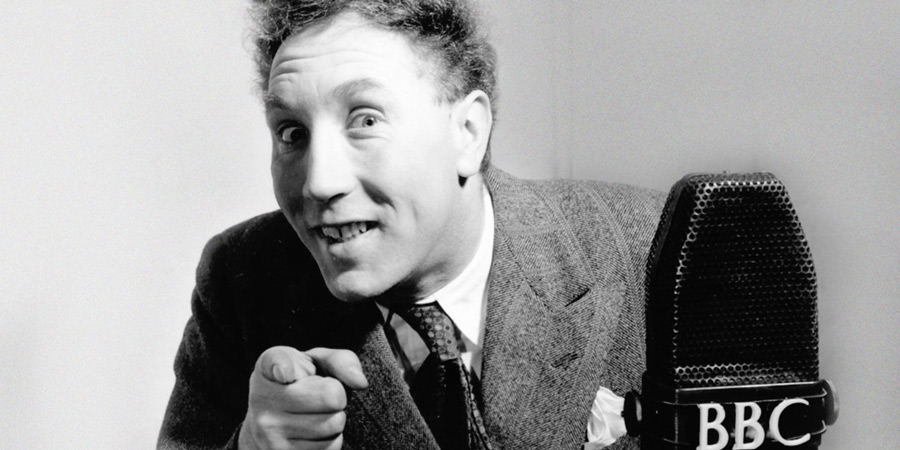
'When I was first writing for him,' he later told me, 'Frank would say, "The only thing is, Eric, you've got to have a beginning, a middle, and then the end's got to come up instead of just fizzling out". He'd give me very helpful little pieces of advice like that. But he was a gift to me. I mean, just to listen to him, he was almost writing the next script for me. Frank's style was his own, and I copied his style, but I did have my own flights of fancy in my head.'
What Sykes did was to use these flights of fancy to craft scripts that contained not jokes but situations. It was, essentially, stand-up serving as sitcom, in which Howerd's established comedy character could at last come fully to life.
As with his own favourite joke - 'Two Irishmen are standing on either side of a river. The first one says: "How do I get to the other side?" The other one replies: "You are on the other side"' - the trick was to blend the sense with nonsense. He wanted there to be something believable about Howerd's hardships, something compelling about the chaos he was combatting.
Sykes did not just 'use' words: he made words work. He controlled them, via Howerd's captivating delivery, so as to act as a catalyst on the imagination (e.g.: 'It was so quiet I could hear the light shining on me'). When one heard his words, one saw his visions.
The effect was electric: never before, and arguably never again, would Frankie Howerd sound so sure, so bright, so right and so joyously alive. One of the first and most memorable of these routines concerned a surreal attempt to transport a couple of 'items' from London up to Crewe:
...And the boss came up and he said, 'Ah, good morning'. He said, 'I want you to collect some goods from the depot and deliver them from Crewe'.
Ooooh, I thought! Ooooooh, good, y'see! No. 'Cos: Crewe! 'Cos, I've always wanted to go abroad!
So. Yes. Anyway. Yes. Anyway.
I went along to the depot, and I saw the foreman. I said, 'Look,' I said, 'I want to sign for these goods'. And he said, 'They're labelled and ready. Get 'em out of here - quick'. So I signed for them, y'see. I went along. They were labelled and ready all right.
Two elephants! Two el-ee-phants! I was A-MAAAAZED!
I said, 'I shall never get these to Crewe!' He said, 'I don't care where you're getting' 'em to, but get 'em out of here!' He said, 'The place has been in uproar. In uproar the place has been!'
So I got a bit of string. And I, um, tied it round their necks, y'see, and I led 'em out into the street. Oooh, I did feel a ninny! I tried to look as if I wasn't with 'em!
Anyway. Well. No!
But the way people stared! The way people stared! You'd think they'd never seen two elephants going down the Underground before!
And I had a shocking - Liss-en! 'Ere! Liss-en! Yes! Ye may titter! Titter ye may!
I had a shocking time with 'em down this Underground. No. What I had to do, y'see, I had to tie one to a slot machine, and push the other one on to the tube train. 'Cos they'd only let me take one on at a time. No. Well, it was rush hour.
And, of course, the elephant was furious, because it had to stand! Yes! Ooh, it played the devil!
So, anyway, I got it to King's Cross station, and I parked it there, y'see, but then I came back for the other one that I'd left tied up. And when I got there, there it was: gone!
So I said to a porter, I said, 'Look, I left an elephant here tied to a slot machine. It's gone!' He said, 'Yes - and so 'as our slot machine!'
Anyway, I dashed into the street and looked for it, and I could soon see the way it had gone, because there were crowds of people lining the road - waiting for the rest of the procession.
What a silly thing to do! I mean, you'd think they'd have more sense, wouldn't you? And, honestly, I've never seen such a silly crowd of people in all me life! None of you were in Tottenham Court Road, were you? No! I didn't think you were. No. Anyway. Um. Now where was I?...
On and on the tall tale went, with its teller sounding like he was having the time of his life. 'Cease!' he shrieked, as the audience's laughter grew louder and louder, 'CEASE!!'
The impact of the Howerd and Sykes collaboration was both immediate and immense. Howerd, all of a sudden, started to relax (so sure he was of the words he was being given, so comfortable was he with the character he had been crafted), while Sykes was energised and empowered. A few months before, he had been working in local rep as a would-be actor, unsure of what kind of career (if any) he might claim, and now here he was, with Howerd, making about half the nation laugh on a regular basis.
'I still lived in Oldham,' Eric would tell me, 'and I went home one weekend - it was a nice, warm, Sunday evening - and I walked along this street, and every door was open (because they used to be in those days when it was a warm evening), and out of every door - every door - I could hear Variety Bandbox, and Frankie Howerd saying the lines that I'd written. And I had to hug myself - because I knew what the next line was!'
It was thanks to the patronage of Howerd that he was able, in time, to pursue his own ambitions as a writer and performer. At the start of the 1950s, Howerd formed a company with him that later evolved into Associated London Scripts, with Spike Milligan and Galton & Simpson as his fellow directors, which gave him independence, security and a fair degree of power.
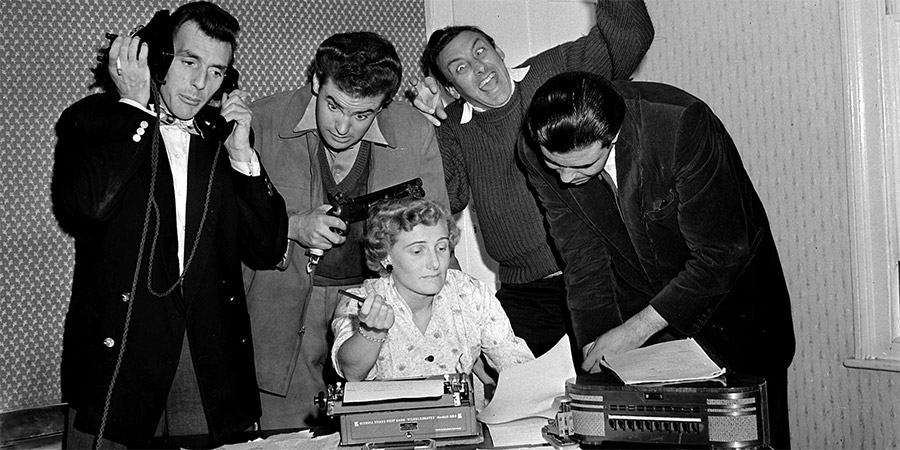
He went on to dominate that decade, becoming post-war Britain's pre-eminent solo comedy writer (and winning his first 'lifetime achievement award,' from the Guild of TV Producers and Directors, at the relatively tender age of thirty-eight in 1961). In terms of versatility, consistency, precision and popularity, no one else came close.
Those performers who benefitted from his scripts knew that they were getting something special. Whereas other writers merely gave them words, Eric Sykes gave them thoughts and feelings as well.
He understood them as people, refined them as personalities, and also knew how to help animate them for an audience, accurately and engagingly, through the rhythms that he wrote and the intonations he suggested. When Tony Hancock, for example, asked Sykes how he wanted a certain line to be spoken, the writer replied: 'As if you are tapping the ash off a cigarette' - and Hancock knew immediately what he meant.
It was the fusion that made his work so funny. He knew that his task was not simply to care for the character and the comedy - it was also to combine the two so tightly and truthfully that any laughter seemed to come from real life.
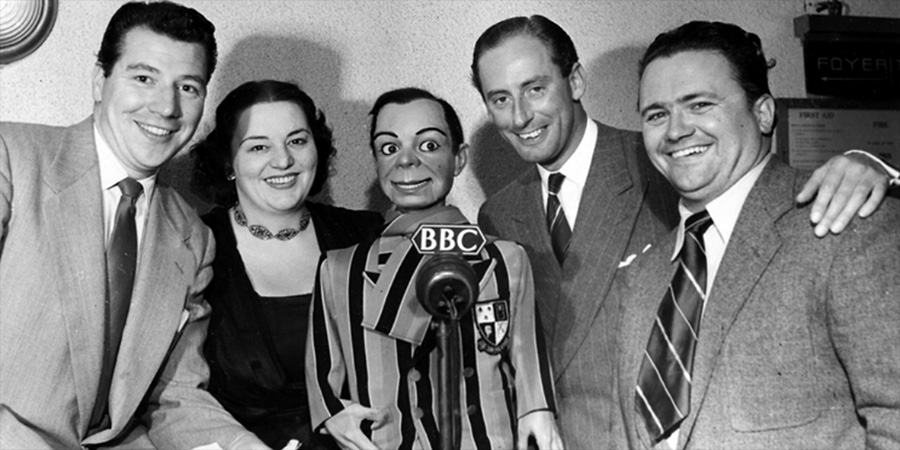
He seemed equally at home in every comic genre. He was a master of the mainstream, making such hugely successful series as Educating Archie (in partnership with his old RAF friend Sid Colin), but he also proved himself remarkably adept as a contributor to the avant-garde, crafting key material for The Goons (whose storylines and structure he strengthened). More than anyone else, he made the art of writing comedy seem like a stable, and admirable, profession.
He also went on to shatter TV comedy's old separation between author and actor when he became the star, alongside Hattie Jacques, of his own BBC sitcom, Sykes. Running for sixteen series, during two spells, from 1960 to 1979, the show highlighted, amongst other things, what an artful performer he was, with a beautiful, almost musical, sense of how to choreograph each comic interaction.
There was a scene, for example, in one of the later episodes, which featured Peter Sellers guesting as a dangerous interloper called Tommy Grando, that saw Eric caught trying to hide from him via a 'feminine' disguise - an awful early 1970s-style navy-blue dress with two bright red vinyl apples emblazoned across the breasts. When Grando orders him to hand the outfit over, Eric tries to resist, prompting a distressed Hat to cry out: 'Oh, Eric, let him have it - you can always buy another one!' Sykes, upon hearing this, stops as if struck on the head, looks at Hat incredulously and then, with a real sense of hurt and outrage in his voice, slaps his hands tightly over his chest and exclaims: 'With two apples???'
It is such a superbly timed and delivered reaction - like a sublime little dance movement - and, in terms of technique, actually matched, on the night, the best that even Sellers had to offer. His achievement in that sitcom, therefore, was twofold: what he wrote, and how he played, deserved the highest of praise.
The show's success, though great, didn't threaten to sate his appetite to engage. Partly an homage to the kinder, gentler, friendlier comic era of Laurel & Hardy, and partly a response to the increasing cliquishness of what now passed as mainstream humour, his own comedy would cling on to the idea, throughout all the years ahead, of belonging to the whole community.
The Plank, which was released in 1967 and based upon an earlier episode of Sykes And A..., would be a dream come true for this most visually-inclined of Britain's leading comedy writers ('a visual laugh,' he once said, 'is worth three pages of dialogue'). Scripted, directed and featuring Sykes himself at the head of a starry cast, the aim was to create a movie that did without all of the things that normally came between the viewer and the basic frame of the comedy action: so there were no camera tricks, no sudden cuts and zooms, no excess of extreme close-ups and, most strikingly, no words.
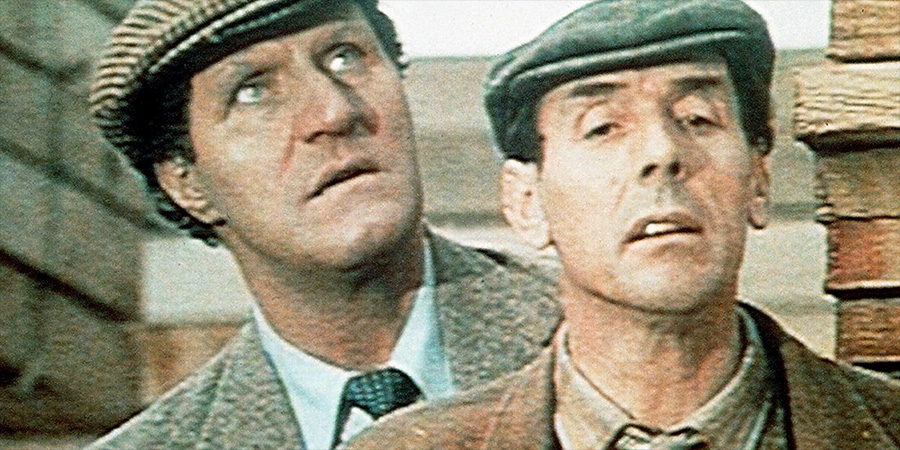
Sykes wrote the script with the camera instead of a pen, capturing all of the comic trials and tribulations experienced by two hapless workmen (played by Sykes and Tommy Cooper) as they struggled to put one wooden plank in its rightful place. The effect was simple, economical and extremely engaging, and the movie's great and enduring success - stretching right across the usual range of ages and areas - would inspire Sykes to return to the genre on several more occasions, sometimes for the big screen (such as It's Your Move and Rhubarb in 1969) and sometimes for the small (such as his later series of shorts for Thames Television, including another iteration of The Plank).
Throughout all of his many successes, he remained resolutely down-to-earth, politely private, and content simply to get on with his work. Never happier than when tucking into a plate of egg and chips ('Take him anywhere, to the most lavish gourmet restaurant,' his friend Johnny Speight would say, 'and he will order egg and chips'), he allowed himself the odd indulgence (such as the camel hair overcoat that he wore to work, usually with a script and a cigar tube or two poking out of its pockets, as well as membership of a good golf course - Coombe Hill), but he much preferred projects to prizes.
The main material symbol of his status was the smart Surrey home in which he and his family (wife Edith and their three daughters - Kathy, Susan and Julie Louise - and one son - David) lived during the Sixties, at St. George's Hill in Weybridge. John Lennon was a neighbour ('well within catapulting distance'), and they'd sit around every Christmas sharing a bottle of wine, improvising comic lines and reminiscing about life back in Lancashire.
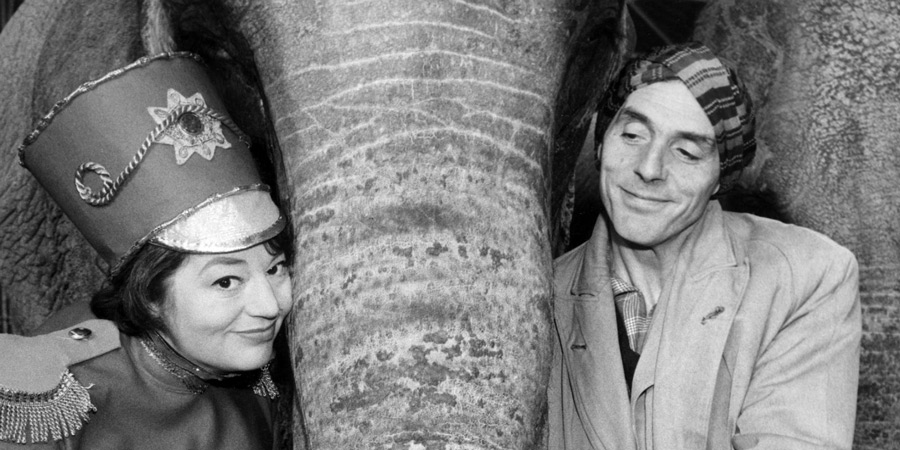
The only things that ever seemed to bother Eric crept out from inside his own head. An unusually superstitious man, he would sometimes have premonitions that could bounce about in his brain, but he appeared to respond to them, swiftly enough, in ways that swept away the worries that would otherwise have cluttered his mind. I experienced that process myself when, late on in his life, he summoned me, somewhat mysteriously, to a meeting about 'a rather delicate matter'.
Once we had walked from his office in London's Orme Court to a nearby Chinese restaurant - the absence of egg and chips on the menu only adding to the sense of the ominously dramatic - and settled down with a glass of wine, he revealed, with an unusually sombre expression, that he was being nagged by the fear that he would not live to complete the autobiography he had recently started, and wanted me to promise that, if he did depart prematurely, I would finish it for him.
When I replied, obviously feeling very touched, that while I hoped my own involvement would never be needed, I would certainly honour his wishes, he visibly relaxed, smiled and gave me a hug, and then snapped straight into professional writing mode, saying: 'Now, what I was thinking was that you could start your part of the book with a chapter that reminisces about us sitting here in this Chinese restaurant...'
He seemed, after that meeting, to sail serenely through the rest of the writing of the book (he would call it, rather ironically in the circumstances, If I Don't Write It, Nobody Else Will), his mood so much brighter and calmer now that he faced the blank page with a clear head. It was as if, having lacked the company and reassurance of a regular writing partner (like, say, Galton & Simpson had always enjoyed), he had found a more imaginative means of exploring, and overcoming, the doubts that threatened to hold him back.
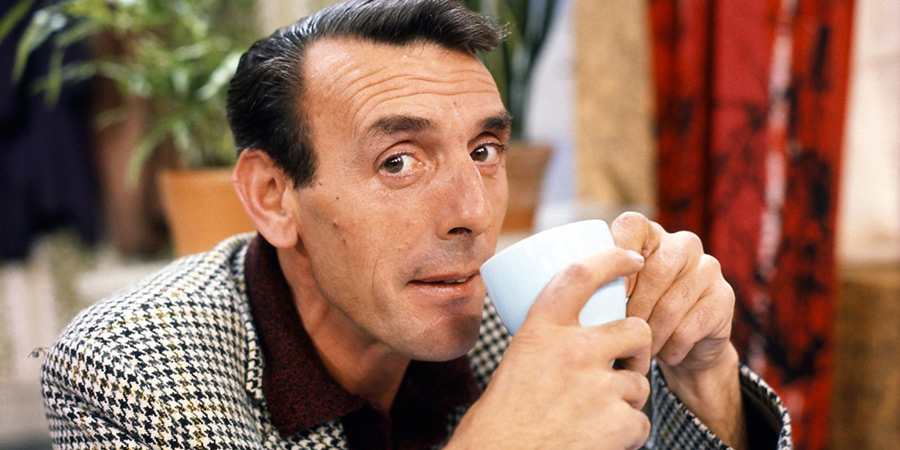
What followed, in this instance, was a wonderful and richly-deserved late period of heartfelt celebration. With the book's publication in 2005 coinciding with him being appointed a CBE, even he, as such a modest and self-effacing man, could not help but be moved by the outpouring of affection he received from so many people both inside and outside of his profession.
'I was, and am, totally dedicated,' he would say, 'to a comedy that induces people to laugh, not chuckle or titter or, at worst, snigger, but to throw back their heads in a joyous burst of capitulation.' No one had ever worked harder to keep achieving such an effect, and it was only right that, during his final few years, he was applauded long and hard for all of his efforts.
Eric Sykes died on the morning of 4th July 2012, at his home at Pelhams Walk in Esher, at the age of eighty-nine. At the memorial service that followed, on the afternoon of 28th January 2013 at St Martin-in-the-Fields in London, as many of his friends as could be included took turns to reflect on one of the sweetest souls any of them had ever met, and then, at the end, the Central Band of the Royal Air Force played people out to the sound of the theme from Sykes.
There was something especially poignant about that occasion, because remembrance - real, genuine, heartfelt remembrance - had always mattered to Eric. He never forgot what, and whom, he loved.
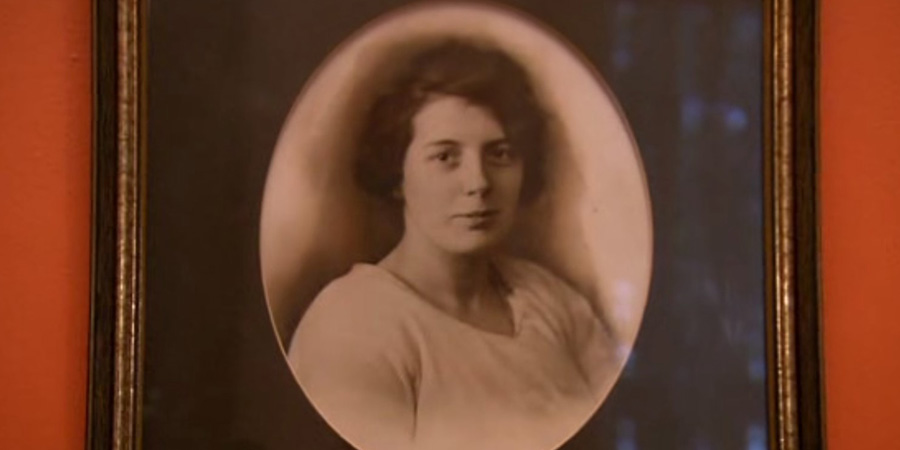
The continuing presence of his late mother, most of all, was something in which he always believed, thinking of her as a kind of guardian angel, guiding him on from one success to the next ('I can tell when she's there,' he once told me quite sincerely. 'I sense a touch on my shoulder'). Whenever I visited him at his office in Orme Court, he would pour us both a whisky (always Glenmorangie), raise his glass to the picture of her on the wall that faced his desk, and, in a warm and wistful voice, toast her memory ('Cheers, Mum').
We should do the same to any image we have of him now, on the occasion of his centenary, as a gesture of gratitude for brightening so many of our lives. Cheers, Eric - happy birthday - and thank you, so much, for everything that you gave us.
Help us publish more great content by becoming a BCG Supporter. You'll be backing our mission to champion, celebrate and promote British comedy in all its forms: past, present and future.
We understand times are tough, but if you believe in the power of laughter we'd be honoured to have you join us. Advertising doesn't cover our costs, so every single donation matters and is put to good use. Thank you.
Love comedy? Find out moreThe Eric Sykes Collection

This set is a comprehensive collection of Eric Sykes's comic films made for Thames Television:
If You Go Down In The Woods Today
Rhubarb, Rhubarb
The Plank (1979)
Mr H Is Late
It's Your Move
First released: Sunday 22nd August 2010
- Released: Monday 1st July 2024
- Distributor: Old Gold Media
- Region: 2
- Discs: 1
- Minutes: 187
![]() Buy and sell old and new items
Buy and sell old and new items
Search for this product on eBay
BCG may earn commission on sales generated through the links above.
- Distributor: Revelation Films Ltd
- Region: 2
- Discs: 1
- Catalogue: PAR61486
![]() Buy and sell old and new items
Buy and sell old and new items
Search for this product on eBay
BCG may earn commission on sales generated through the links above.
The Likes Of Sykes - Three Classic ITV Shows

By the early 1970s, Oldham-born Eric Sykes had become one of TV's best-loved comedy performers. Following the phenomenal success of the Sykes series he spread his wings in a number of one-off shows and films. This set comprises three shows made for Thames between 1971 and 1982.
Filled with Eric's warm observational humour and exploiting his keen eye for the absurd, the shows reunite him with several comedy collaborators, including fellow Plank star Tommy Cooper and long-term working partner, friend and Sykes co-star Hattie Jacques; Diana Coupland (Bless This House), Glaswegian actor/comedian Chic Murray, and Dandy Nichols (Till Death Us Do Part) are among the other guest stars, with musical interludes from classical guitarist John Williams.
Sykes With The Lid Off
Eric dares to take the lid off the many and varied forms of theatrical entertainment, with the help of Hattie Jacques, Dilys Watling, Leslie Noyes, Philip Gilbert and dancers The Ladybirds.
The Likes Of Sykes
Eric has a Walter Mitty-style dream that he will produce a star-studded spectacular on Broadway - but will his dreams die before his starry eyes? Diana Coupland and John Williams are Eric's special guests.
The Eric Sykes 1990 Show
Eric makes a prediction: by 1990, celebrities will have to pay for their own TV shows. Starring in his vision of the future are Tommy Cooper, Chic Murray, Dandy Nichols, Leslie Mitchell and classical guitarist John Williams.
First released: Monday 24th January 2011
- Distributor: Network
- Region: 2
- Discs: 1
- Catalogue: 7953405
![]() Buy and sell old and new items
Buy and sell old and new items
Search for this product on eBay
BCG may earn commission on sales generated through the links above.
Sykes - The Complete Series

Comedy genius Eric Sykes stars alongside Hattie Jacques, Richard Wattis and Deryck Guyler in the complete run of this classic comedy series.
Showcasing Eric's whimsical, slightly anarchic sense of humour, Sykes saw Eric basically playing himself just one step removed from normality! Sharing a house with his twin sister, Hat, Eric has to suffer the slings and arrows of everyday life something he invariably does with bad grace and obstinacy. With snobbish next door neighbour Mr Brown and nosey local PC "Corky" Turnbull always on hand to help turn a drama into a crisis, it's no wonder Eric spends half his time fantasising and the other half coping with catastrophe!
This set contains all seven series: 68 episodes of this classic BBC comedy.
First released: Monday 26th June 2017
- Distributor: Network
- Region: 2
- Discs: 12
- Minutes: 1,970
- Subtitles: English
- Catalogue: 7954602
![]() Buy and sell old and new items
Buy and sell old and new items
Search for this product on eBay
BCG may earn commission on sales generated through the links above.
Spike & Co.

This is the story of how four people, grouped together inside a set of offices five floors above a greengrocer's shop on Shepherd's Bush Green in West London, launched a golden age of British comedy.
On any weekday morning, if you dared to clamber over the crates of fruit and veg outside on the pavement, and climb the five flights of stairs to Associated London Scripts, you would find Spike Milligan, Eric Sykes, Ray Galton & Alan Simpson, shaping the latest shows, swapping the odd story and searching for a funnier line.
Together, this eclectic bunch, and their bizarre office block, were responsible for a golden age in British comedy, which included The Goons, Hancock's Half Hour, Sykes, Steptoe And Son, Comedy Playhouse, The Frankie Howerd Show, Beyond Our Ken, Round The Horne, The Arthur Haynes Show, The Army Game, Bootsie & Snudge, That Was The Week That Was, and Till Death Us Do Part.
Spike & Co. is their incredible story.
First released: Thursday 19th October 2006
- Published: Wednesday 25th October 2006
- Publisher: Hodder & Stoughton
- Minutes: 137
![]() Buy and sell old and new items
Buy and sell old and new items
Search for this product on eBay
BCG may earn commission on sales generated through the links above.
- Publisher: Hodder & Stoughton
- Pages: 448
- Catalogue: 9780340898086
![]() Buy and sell old and new items
Buy and sell old and new items
Search for this product on eBay
BCG may earn commission on sales generated through the links above.
- Published: Thursday 9th August 2007
- Publisher: Hodder & Stoughton
- Pages: 448
- Catalogue: 9780340898109
![]() Buy and sell old and new items
Buy and sell old and new items
Search for this product on eBay
BCG may earn commission on sales generated through the links above.
- Released: Thursday 5th October 2006
- Distributor: Hodder & Stoughton
- Discs: 2
- Catalogue: 9781844563111
![]() Buy and sell old and new items
Buy and sell old and new items
Search for this product on eBay
BCG may earn commission on sales generated through the links above.
UFOs Are Coming Wednesday

The universe is at risk and a message is sent to earth - "UFO's are coming Wednesday". Is this a hoax, and if so who is the mysterious visitor to Norman Waterhouse's barber shop in Grapplewick, Lancashire?
First published: Thursday 16th November 1995
- Publisher: Virgin
- Pages: 195
- Catalogue: 9781852275976
![]() Buy and sell old and new items
Buy and sell old and new items
Search for this product on eBay
BCG may earn commission on sales generated through the links above.
- Published: Thursday 20th June 1996
- Publisher: Virgin
- Pages: 240
- Catalogue: 9780863699245
![]() Buy and sell old and new items
Buy and sell old and new items
Search for this product on eBay
BCG may earn commission on sales generated through the links above.
Smelling Of Roses

Sparks and Miller, two reluctant Desert Rats, were trying desperately to have a quiet war, but despite all of their efforts, they somehow manage to become front-page heroes. No matter what they do they come up smelling of roses.
First published: Thursday 6th November 1997
- Publisher: Virgin
- Pages: 192
- Catalogue: 9781852276591
![]() Buy and sell old and new items
Buy and sell old and new items
Search for this product on eBay
BCG may earn commission on sales generated through the links above.
- Published: Thursday 16th July 1998
- Publisher: Virgin
- Pages: 272
- Catalogue: 9780753502808
![]() Buy and sell old and new items
Buy and sell old and new items
Search for this product on eBay
BCG may earn commission on sales generated through the links above.
The Great Crime Of Grapplewick

The major of Grapplewick is also chief of the fire brigade, and as the brigade doubles up as the town's brass band, he is the bandmaster too. Into the town comes Terence, a criminal searching for a former partner in crime named Helliwell. This won't be easy as half the population goes by this name.
First published: Thursday 21st November 1996
- Publisher: Virgin
- Pages: 192
- Catalogue: 9781852276010
![]() Buy and sell old and new items
Buy and sell old and new items
Search for this product on eBay
BCG may earn commission on sales generated through the links above.
- Published: Thursday 19th June 1997
- Publisher: Virgin
- Pages: 208
- Catalogue: 9780753500798
![]() Buy and sell old and new items
Buy and sell old and new items
Search for this product on eBay
BCG may earn commission on sales generated through the links above.
The Eric Sykes Compendium: Bumper Three Novel Edition

The Eric Sykes Compendium is a bumper edition of three novels from the comedy genius:
UFOs Are Coming Wednesday
When a mysterious visitor demonstrates his amazing alien powers to the local dignitaries of Grapplewick, rumours fly and hysteria mounts.
The Great Crime Of Grapplewick
The sleepy northern town of Grapplewick is turned on its head when clueless criminals Terence and Rembrandt turn up seeking revenge.
Smelling Of Roses
Sparks and Miller are two ordinary soldiers desperate to avoid war who can hardly believe their bad luck when they hit the headlines as full-blown heroes.
With characters and situations that are pure Sykes, this volume is a bundle of laughs.
First published: Thursday 5th October 2006
- Publisher: Virgin
- Pages: 608
- Catalogue: 9780753511930
![]() Buy and sell old and new items
Buy and sell old and new items
Search for this product on eBay
BCG may earn commission on sales generated through the links above.
If I Don't Write It, Nobody Else Will

The long awaited story of one of Britain's greatest comic legends.
"Some people walk on stage and the audience warms to them. You can't explain it, and you shouldn't try. It's an arrogant assumption to say you 'decide' to become a comedian. The audience decides for you." - Eric Sykes, December 2001
From his early days writing scripts for Bill Fraser and Frankie Howerd through decades of British radio and television comedy - Educating Archie, Sykes And A..., Curry & Chips, The Plank - to his present day ventures into film and theatre, starring in The Others with Nicole Kidman and appearing in Peter Hall's recent production of As You Like It, Eric Sykes has carved himself an enduring place as one of Britain's greatest writers and performers.
In his much anticipated autobiography, Sykes reveals his extraordinary life working alongside a generation of legendary comedians and entertainers, despite being dogged by deafness and eventually virtual blindness. His hearing problems began in the early days of his career in the 1950s, around the time he wrote, directed and performed in the spoof pantomime Pantomania for the BBC. Undeterred however, Sykes learned to lip-read, going on to write and appear in a number of BBC productions including Opening Night and Val Parnell's Saturday Spectacular, the first of two shows he made with Peter Sellers, a great life-long friend. From 1959 until her death in 1980, Sykes starred with Hattie Jacques in one of Britain's best loved sitcoms, Sykes And A.../Sykes. Throughout the two decade run of this show he continued to work alongside a host of stars including Charlie Drake, Tommy Cooper, Tony Hancock, Spike Milligan, Johnny Speight, Ray Galton and Alan Simpson.
Curry & Chips was short-lived due to the deluge of complaints about the series content. But Eric Sykes was the only one who refused to use bad-language; his comedy has always sported an essential core of warm humanity and this, along with his genuine creative genius continues to prove an unforgettably winning combination.
First published: Wednesday 14th September 2005
- Published: Tuesday 2nd May 2006
- Publisher: HarperCollins
- Pages: 512
- Catalogue: 9780007177851
![]() Buy and sell old and new items
Buy and sell old and new items
Search for this product on eBay
BCG may earn commission on sales generated through the links above.
- Published: Thursday 17th September 2009
- Publisher: HarperCollins
- Download: 1.23mb
BCG may earn commission on sales generated through the links above.
- Publisher: Fourth Estate Ltd
- Pages: 502
- Catalogue: 9780007177844
![]() Buy and sell old and new items
Buy and sell old and new items
Search for this product on eBay
BCG may earn commission on sales generated through the links above.
- Publisher: HarperCollins
- Catalogue: 9780007206698
![]() Buy and sell old and new items
Buy and sell old and new items
Search for this product on eBay
BCG may earn commission on sales generated through the links above.
Eric Sykes' Comedy Heroes

Eric Sykes is one of Britain's creative comedy geniuses combining personal warmth, superbly observed written and performed comedy and a deeply intimate understanding of what a viewing audience wants. Here he has assembled a comedy hall of fame for those who have inspired, entertained and, most of all, amused him.
Including tributes to comedy greats Tommy Cooper, Les Dawson, Ken Dodd, Spike Milligan, Peter Sellers and many, many more, this is a beautiful and personal testimony to the wonderful characters who have stimulated Eric's life-long love affair with laughter.
First published: Thursday 9th October 2003
- Published: Thursday 5th October 2006
- Publisher: Virgin
- Pages: 176
- Catalogue: 9780753511886
![]() Buy and sell old and new items
Buy and sell old and new items
Search for this product on eBay
BCG may earn commission on sales generated through the links above.
- Published: Thursday 31st May 2012
- Publisher: Virgin
- Download: 0.83mb
BCG may earn commission on sales generated through the links above.
- Publisher: Virgin
- Pages: 196
- Catalogue: 9781852270988
![]() Buy and sell old and new items
Buy and sell old and new items
Search for this product on eBay
BCG may earn commission on sales generated through the links above.

